小学英语时态讲解与练习
译林版小学英语四种时态复习-附练习及答案
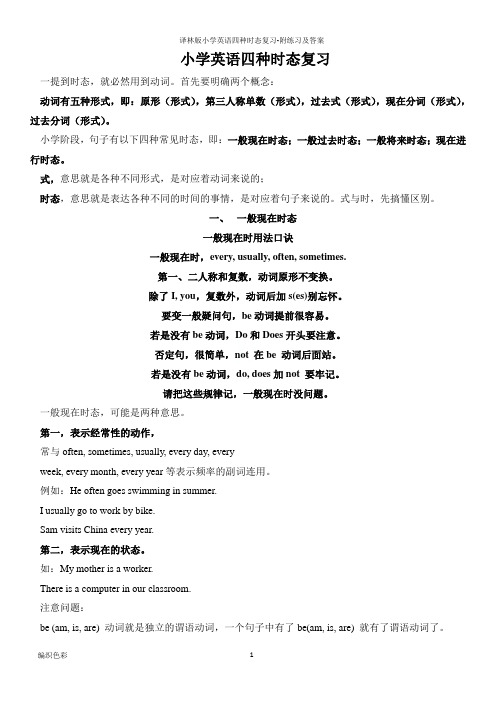
小学英语四种时态复习一提到时态,就必然用到动词。
首先要明确两个概念:动词有五种形式,即:原形(形式),第三人称单数(形式),过去式(形式),现在分词(形式),过去分词(形式)。
小学阶段,句子有以下四种常见时态,即:一般现在时态;一般过去时态;一般将来时态;现在进行时态。
式,意思就是各种不同形式,是对应着动词来说的;时态,意思就是表达各种不同的时间的事情,是对应着句子来说的。
式与时,先搞懂区别。
一、一般现在时态一般现在时用法口诀一般现在时,every, usually, often, sometimes.第一、二人称和复数,动词原形不变换。
除了I, you,复数外,动词后加s(es)别忘怀。
要变一般疑问句,be动词提前很容易。
若是没有be动词,Do和Does开头要注意。
否定句,很简单,not 在be 动词后面站。
若是没有be动词,do, does加not 要牢记。
请把这些规律记,一般现在时没问题。
一般现在时态,可能是两种意思。
第一,表示经常性的动作,常与often, sometimes, usually, every day, everyweek, every month, every year等表示频率的副词连用。
例如:He often goes swimming in summer.I usually go to work by bike.Sam visits China every year.第二,表示现在的状态。
如:My mother is a worker.There is a computer in our classroom.注意问题:be (am, is, are) 动词就是独立的谓语动词,一个句子中有了be(am, is, are) 就有了谓语动词了。
句子中不能同时出现两个谓语动词。
不少同学经常出这样的错误:The boy is often eats hamburgers.(错)应当改为:The boy often eats hamburgers.二、现在进行时态正在进行时态口诀现在分词用途多,进行时态不用说。
小学英语四大时态总结及练习题

你知道时态是什么意思吗?时态代表什么吗?小学英语就四个时态,你掌握了吗?勤加练习,百战不殆I.把下列动词变为第三人称单数形式。
1. clean--2. go--3. have--4. do-5.play--6. fly--7. come-- brush-9. watch-- 10. study-- 11. ask--12.answer--13. swim-- 14. catch-- 15. write--16. eat-- 17. make-- 18. paint—19. learn-- 20. phone-- 21. run—22. hop-- 23. sing-- 24. pick—II.把下列动词变成过去式is\am________ fly______ plant________are________ drink_________ play_______go________ make ______ does_________dance________ worry________ ask _____taste_________ eat__________ draw________put ______ throw________ kick_________pass_______ do ________III.把下列动词变成动名词形式。
Wake________ make__________ come____________have____________Take_________ leave__________ rid_________, regret__________, Begin________,cut________, get_________, hit_________, run_________, set_________, sit__________, spit__________, stop_________, swim________, beg_________, drop__________, fit_________, nod_________, dig___________, forget_________, travel_________visit_________Carry_________enjoy___________ play ___________ study ________die_________ lie_________多加练习,百战不殆之时态篇一、用单词的正确形式填空:1.Mike _________ (do) his homework every day.2.There __________(be) some water in the glass.3.We like ________ (play) basketball after class.4.I like singing. I often _________(listen) to the music in the evening.5.My grandma_________(watch) TV every day.二、判断句子的正误, 并改正。
小学英语四大时态总结及练习题
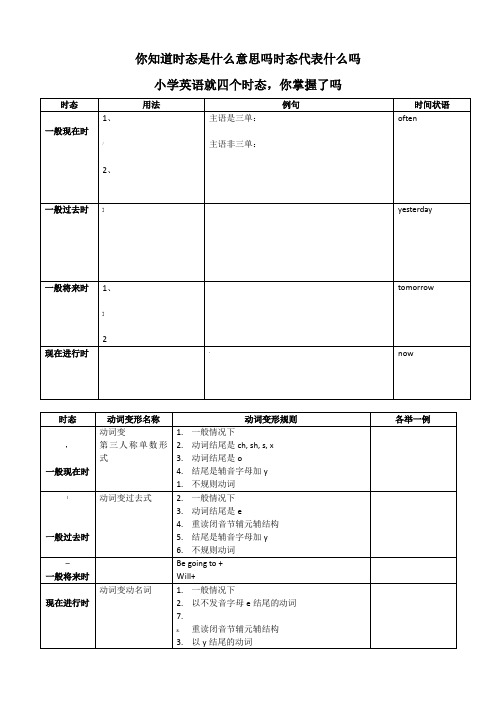
你知道时态是什么意思吗时态代表什么吗小学英语就四个时态,你掌握了吗你能发现它们之间的共同点和不同点吗勤加练习,百战不殆I.把下列动词变为第三人称单数形式。
1. clean--2. go--3. have--4.do-6. fly--7. come-- brush-9. watch-- 10. study-- 11. ask--(13. swim-- 14. catch-- 15. write--16. eat-- 17. make-- 18. paint—19. learn-- 20. phone-- 21. run—22. hop-- 23. sing-- 24. pick—II.把下列动词变成过去式is\am________ fly______ plant________are________ drink_________ play_______go________ make ______ does_________dance________ worry________ ask _____ taste_________ eat__________ draw________put ______ throw________kick_________ pass_______ do ________III.把下列动词变成动名词形式。
Wake________ make__________ come____________have____________!Take_________ leave__________ rid_________, regret__________, Begin________,cut________, get_________, hit_________, run_________, set_________, sit__________, spit__________, stop_________, swim________,beg_________, drop__________, fit_________, nod_________, dig___________, forget_________, travel_________visit_________Carry_________ enjoy___________ play ___________ study ________die_________ lie_________多加练习,百战不殆之时态篇一、用单词的正确形式填空:1.Mike _________ (do) his homework every day.2.There __________(be) some water in the glass.3.We like ________ (play) basketball after class.4.I like singing. I often _________(listen) to the music in the evening.5.【6.My grandma_________(watch) TV every day.二、判断句子的正误, 并改正。
小学六年级上册英语时态精讲练习
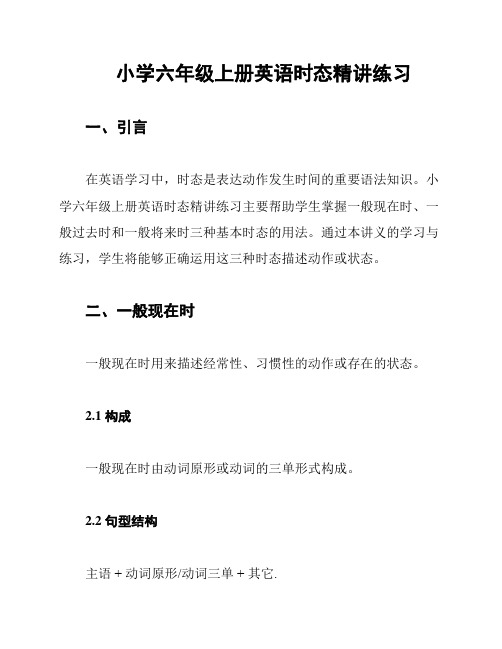
小学六年级上册英语时态精讲练习一、引言在英语学习中,时态是表达动作发生时间的重要语法知识。
小学六年级上册英语时态精讲练习主要帮助学生掌握一般现在时、一般过去时和一般将来时三种基本时态的用法。
通过本讲义的学习与练习,学生将能够正确运用这三种时态描述动作或状态。
二、一般现在时一般现在时用来描述经常性、习惯性的动作或存在的状态。
2.1 构成一般现在时由动词原形或动词的三单形式构成。
2.2 句型结构主语 + 动词原形/动词三单 + 其它.2.3 练习1. I (eat)_____ breakfast every morning.2. She (go)_____ to school by bus.3. The cat (sleep)_____ on the sofa.三、一般过去时一般过去时用来描述过去发生的动作或存在的状态。
3.1 构成一般过去时由动词的过去式构成。
3.2 句型结构主语 + 动词过去式 + 其它.3.3 练习1. I (watch)_____ a movie yesterday.2. She (visit)_____ her grandparents last week.3. They (play)_____ soccer in the park.四、一般将来时一般将来时用来描述将来要发生的动作或存在的状态。
4.1 构成一般将来时有两种构成方式:will + 动词原形和 be going to + 动词原形。
4.2 句型结构1. 主语 + will + 动词原形 + 其它.2. 主语 + be going to + 动词原形 + 其它.4.3 练习1. I (buy)_____ a new bike next month.2. She (travel)_____ to Japan with her family.3. They (move)_____ to a new house in two years.五、总结通过本讲义的学习与练习,学生应掌握一般现在时、一般过去时和一般将来时三种基本时态的构成、句型结构和用法。
小学英语时态综合练习题
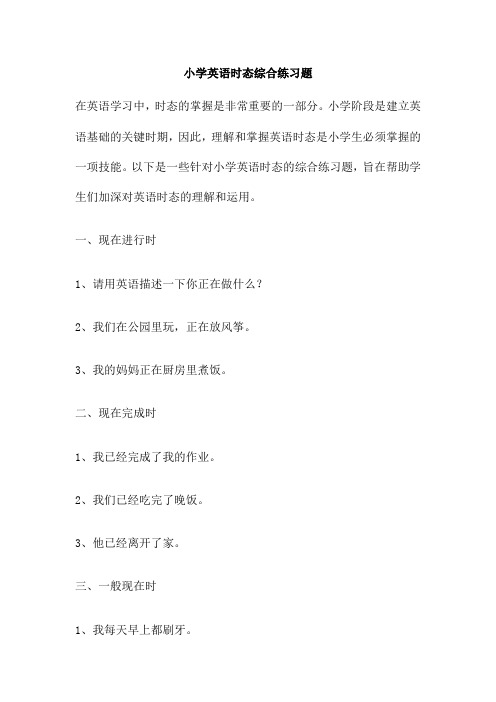
小学英语时态综合练习题在英语学习中,时态的掌握是非常重要的一部分。
小学阶段是建立英语基础的关键时期,因此,理解和掌握英语时态是小学生必须掌握的一项技能。
以下是一些针对小学英语时态的综合练习题,旨在帮助学生们加深对英语时态的理解和运用。
一、现在进行时1、请用英语描述一下你正在做什么?2、我们在公园里玩,正在放风筝。
3、我的妈妈正在厨房里煮饭。
二、现在完成时1、我已经完成了我的作业。
2、我们已经吃完了晚饭。
3、他已经离开了家。
三、一般现在时1、我每天早上都刷牙。
2、我们每周都去公园玩。
3、他每天晚上都读书。
四、一般过去时1、昨天我去了电影院。
2、上周我们去了海滩。
3、昨晚她看了电视。
五、一般将来时1、我明天将要完成作业。
2、我们下周将要去看电影。
3、他将在下个月搬到新家。
以上练习题旨在帮助学生理解和掌握基本的英语时态。
对于小学生来说,时态的学习可能相对复杂,但通过反复练习和实际应用,他们可以逐渐掌握并开始在日常生活中运用这些时态。
教师和家长可以鼓励学生多做类似的练习,帮助他们提高英语时态的理解和运用能力。
小学英语时态练习题一、一般现在时1、I eat apples every day. (我每天吃苹果。
)2、He studies hard every day. (他每天努力学习。
)3、They play basketball every week. (他们每周打篮球。
)二、现在进行时1、I am eating apples now. (我现在正在吃苹果。
)2、He is studying hard now. (他现在正在努力学习。
)3、They are playing basketball now. (他们现在正在打篮球。
)三、一般过去时1、I ate apples yesterday. (我昨天吃了苹果。
)2、He studied hard yesterday. (他昨天努力学习了。
)3、They played basketball yesterday. (他们昨天打篮球了。
小学英语四大时态总结(附小升初时态考题)

4. 以o结尾的单词: 有生命加s 。
tomato-tomatoespotato-potatoes无生命加espiano-pianosphoto-photoszoo-zoosradio-radios小升初时态专题综合训练1.(成都市青羊区小学毕业卷)John _____ football.A. likes playingB. likes playC. like play2.(深圳市龙岗区小学毕业卷)Does your mother _____ football?A. likeB. likesC. like play3.(芜湖市第三中学招生卷)They usually _____ TV in the evening.A. watchB. will watchC. are watchingD. watches4.(上海市奉贤区小学毕业卷)—What do you usually do on the weekend?—I often ____.A. do my homeworkB. did my homeworkC. doing my homework5. (杭州市西湖区小学毕业卷)I don’t like _____ thril lers(恐怖片)______ playing baseball.A. watching; orB. watching; andC. to watch; or6.(菏泽市晨曦中学招生卷)Bob often _____ to school.A. walkB. walksC. walked7.(南昌铁路一中初中部招生卷)My pen ______ on my desk ten minutes ago.But it _____ there now.A. is; isn’tB. was; isn’tC. is; is8.(长沙市宁乡县小学毕业卷)Mike is _____ after his classmates.A. runsB. runingC. running9.(桂林市奎光学校招生卷)Be quiet! The babies ________.A. sleepB. are sleepingC. slept10. (武汉市青山区小学毕业卷)______ he _____ his homework yesterday?A. Does; doB. Did; didC. Did; do11(北京市朝阳区小学毕业卷)—What did you do last weekend?—I ______.A. go swimmingB. did my homeworkC. went swim12.(芜湖市第十一中学招生卷)—What’s your hobby?—_____ is my hobby.A. Collecting stampsB. Collect stampsC. Stamps13.(广州市白云区小学毕业卷)—Where were you just now?—I _____ at school.A. isB. wasC. were14.(武汉市青山区小学毕业卷)______ he ______ his grandparents lastmonth?A. Did; visitedB. Did; visitC. Do; visited15.(郑州市二七区小学毕业卷)Last week, we _____ a _____ race.A. hard; runningB. have; runningC. had; running16.(福州市仓山区小学毕业卷)I______ to the park last week.A. goB. wentC. going17.(合肥市蜀山区小学毕业卷)If I _____ you tomorrow, I will give youthe receipt(收据)。
小学英语时态讲解及练习可直接.docx

小学英语语法【一】一般现在时一般现在时基本用法介绍一、一般现在时的功能1.表示事物或人物的特征、状态。
如:The sky is blue.天空是蓝色的。
2.表示经常性或习惯性的动作。
如:I get up at six every day.我每天六点起床。
3.表示客观现实。
如: The earth goes around the sun.地球绕着太阳转。
一般现在时用法练习一、出下列动词的第三人称单数drink ________ go _______ stay________ make ________look _________ have_______ pass_______ carry ____ come________ watch______ plant_______fly ________study_______ brush________ do______ teach_______ likeplay read wash be二、用括号内动词的适当形式填空。
1.He often ________(have) dinner at home.2.Daniel and Tommy _______(be) in Class One.3.We _______(not watch) TV on Monday.4.Nick _______(not go) to the zoo on Sunday.5.______ they ________(like) the World Cup?6.What _______they often _______(do) on Saturdays?7._____ your parents _______(read) newspapers every day?8.The girl _______(teach) us English on Sundays.9.She and I ________(take) a walk together every evening.10.There ________(be) some water in the bottle.11.Mike _______(like) cooking.12.They _______(have) the same hobby.13.My aunt _______(look) after her baby carefully.14.You always _______(do) your homework well.15.I _______(be) ill. I’m staying in bed.16.She _______(go) to school from Monday to Friday.17.Liu Tao _______(do) not like PE.18.The child often _______(watch) TV in the evening.19.Su Hai and Su Yang _____(have) eight lessons this term.20. - What day _____(be) it today?-It’s Saturday.三、按照要求改写句子2.I do my homework every day.(改为一般疑问句,作否定回答)_____________________________________________________3.She likes milk.(改为一般疑问句,作肯定回答)__________________________4.Amy likes playing computer games.(改为一般疑问句,作否定回答)___________________________________6.He speaks English very well.(改为否定句)_______________________________________________7.John comes from Canada.(对划线部分提问)_______________________一般现在时练习1. He often(have) dinner at home.2. Daniel and Tommy(be) in Class One.3. We(not watch) TV on Monday.4. Nick(not go) to the zoo on Sunday.5.they(like)the World Cup?6. What they often(do) on Saturdays?7.your parents(read)newspapers every day?8. The girl(teach)us English on Sundays.9. She and I(take) a walk together every evening.10. There(be) some water in the bottle.小学英语语法【二】现在进行时现在进行时1.现在进行时表示现在正在进行或发生的动作,也可表示当前一段时间内的活动或现阶段正在进行的动作。
小学英语四种时态的综合讲解及练习

一般将来时:定义:一般将来时表示将来某一时刻的动作或状态,或将来某一段时间内经常的动作或状态。
构成:(1)be going to + 动词原形(2)will/shall + do用法:1)表示将来的动作或状态一般将来时常与一些表示将来的时间状语连用,如:tomorrow(明天),next week(下周),from nowon(从现在开始);in the future(将来);someday (未来的某一天) 等。
2)表示将来经常发生的动作I’ll teach you English every Wednesday next month.★★★“be going to+动词原形”表示即将发生的或最近打算进行的事。
例如:①It is going to rain. 要下雨了。
②We are going to have a meeting today. 今天我们开会。
Step Three: Do Some Exercise一、用will 或will not 以及括号中的动词完成句子1、I a Chinese song.(sing)2、Sally the tennis match.(not win)3、You the one-day trip to Guangzhou.(enjoy)4、Flora at home this weekend.(not stay)二、用括号内的词和be going to 完成问答1、(when/we/ have dinner? We / it / at seven o’clock)A When are we going to have dinner?B We are going to have it at seven o’clock.2、(Where / you /meet your friends? We / them /at the school gate)AB3、(you and Ling / play football/ today? No / we/ table tennis)AB现在进行时be+动词ing。
小学英语时态精讲及练习

按要求完成句子
1.Do you often play football after school? (肯定 回答)
2. I have many books. (改为否定句) 3. My sister likes peaches.(改为否定句) 4. She lives in a small town near New
小学英语时态
四种时态
一般现在时 现在进行时 将来时 过去时
一般现在时
一般现在时:表示经常性的事情,习惯 性的动作或一般性事实。 时间状语: often 经常, usually通常, always 总是,every day每天, sometimes 有时等。
句子结构:1.主语+is/am/are+其他 2.主语(非单三)+动词原形+其他 3.主语(单三)+动词s或es+其他
work, ( )2.
Wwhoork_B_._Bw__o_rk_s_,
work C. work, English best in
works your class?
speak B. speaks C. speaking
( )3. He often ____C______ the windows .
put-putting, begin-beginning ,swim-swimming, run-running, …
现在进行时
studys_t_u_dy_ing make_m_a_k_ing swim_sw_i_m_ming stop_s_to_p_p_ing come_c_o_m_ing close_c_l_os_i_ng have_h_a_v_ing run_r_u_n_ning drive_d_r_iv_in_g wash_w_a_shing begin—be—ginninwg atch_w_a_tching take—ta—king talk—ta—lking put—pu—tting
(完整版)小学英语四种时态知识点加练习

小学英语四种时态知识点加练习一、一般此刻时一. 意义:表示常常发生的事情,动作或存在的状态二 . 组成及变化1.be 动词的变化。
一定句:主语 +be(am,is,are)+ 其余。
如:I am a boy. 我是一个男孩。
否认句:主语 + be + not + 其余。
如: He is not a worker. 他不是工人。
一般疑问句: Be +主语 +其余。
如:-Are you a student?-Yes. I am. / No, I'm not.特别疑问句:疑问词+一般疑问句。
如:Where is my bike?2.行为动词的变化。
l 、当主语为第一,二人称及复数时,助动词为do一定句:主语 +动词原形 (+ 其余 )。
如:We often play basketball after school.否认句:主语 + don't+ 动词原形 (+其余 )。
如: we don’t play basketball after school.一般疑问句: Do + 主语 +动词原形 +其余 ?如:Do you often play basketball after school?Yes, we do. / No, we don't.特别疑问句:疑问词+以 do 开头的一般疑问句?如:What do you often do after school ?2、当主语为第三人称单数时,助动词为does一定句:主语 +动词三单式 (+其余 )。
如:He swims well.否认句:主语 + doesn ’t+动词原形 (+ 其余 )。
如: He doesn’t swim well..一般疑问句: Does +主语 +动词原形 +其余。
如: Does he swim well ?Yes, he does. / No, he doesn't.特别疑问句:疑问词+以 does开头的一般疑问句?如:How does your father go to work?三.第三人称单数的动词变化规则(只有在第三人称为主语的一定句中,动词才用三单式)(1) 多半动词直接加 s: runs gets likes collets takes plays climbs .(2) 结尾是 s, x, sh, ch, o,前为辅音字母 , 结尾加 es : watches teaches goes does washes crosses mixes brushes(3) 动词末端 y 前为辅音 :将 y 改为 i 加 es: study → studies fly → fliescarry → carries cry → cries但在 y 前假如为元音则直接加s: buys says四.时间标记: always , usually , often , sometimes ,every一般此刻时练习题I.用以下单词的适合形式填空1.We often___________(play) in the playground.2.He _________(get) up at six o’ clock.3.__________you _________(brush) your teeth every morning?4.What________________(do) he usually________________(do) after school?5.Danny ________________(study) English, Chinese, maths, science and Art at school.6.Mike sometimes __________(go) to the park with his sister.7.At eight at night, she __________(watch) TV with his parents.8.________ Mike________(read) English every day?9.How many lessons_________your classmates________(have) on Monday?10.What time_________his mother_________(do) the housework?II.改句子1.Do you often play football after school? (改为一定句)2.I have many books. (改为否认句)3.Gao Shan ’ s sister likes playing table tennis(改为否认句)4.She lives in a small town near New York. (改为一般疑问句)5.I watch TV every day. (改为一般疑问句)6.We have four lessons.(改为否认句)7.Nancy doesn’ t run fast(改为一定句)二、此刻进行时一、观点此刻进行时表示说话时正在进行或发生的动作 ,也可表示目前一段时间内的活动或现阶段正在进行的动作。
现在进行时讲解(含讲解及练习)

现在进行时讲解(含讲解及练习)概述现在进行时是英语语法中的一种时态,用来表示目前正在进行或发生的动作。
它通常由be动词的现在分词(-ing)形式加上动词的基本形式构成。
结构现在进行时的结构为:主语 + be动词(am/is/are)+ 现在分词(-ing)+ 其他成分。
示例:- I am studying for my exam.- He is watching a movie.- They are playing football.用法1. 表示目前进行的动作现在进行时常用于表示目前正在进行的动作,强调动作的暂时性和临时性。
示例:- She is cooking dinner right now.- We are talking about our vacation plans.2. 表示近期安排或计划现在进行时也可以用于表示近期安排或计划的动作。
示例:- I am meeting my friend later this afternoon.- They are traveling to Europe next week.练请用现在进行时填空。
1. My sister __________ (read) a book in her room.2. We __________ (study) for our English test at the moment.3. They __________ (play) basketball in the park every Sunday.答案:1. is reading2. are studying3. play4. is working总结现在进行时是表示目前正在进行或发生的动作的一种时态。
通过掌握其基本结构和正确用法,我们可以更准确地表达目前的动作和近期的安排。
请通过练习更加熟悉和掌握现在进行时的用法。
小学英语四大时态总结及练习题

小学英语四大时态总结及练习题1. 简单现在时(Simple Present Tense)用法:表示现在正在进行的事情,或者经常性、习惯性的动作或状态。
构成:主语+ 动词原形+ 其他肯定句:I play basketball every day.否定句:I don't play basketball every day.一般疑问句:Do you play basketball every day?练习题:1. The sun (rise) in the east.2. We (love) our parents very much.3. (Do) you like to eat ice cream?4. Tom (not like) to go to school.5. They (visit) Beijing last year.2. 简单过去时(Simple Past Tense)用法:表示在过去某个时间点已经结束的动作或状态。
构成:主语+ 动词过去式+ 其他肯定句:I played basketball yesterday.否定句:I didn't play basketball yesterday.一般疑问句:Did you play basketball yesterday?练习题:1. Mary (go) to the park yesterday.2. We (have) a party last night.3. (Did) you see the movie yesterday?4. Lucy (not want) to go to the zoo last week.5. They (visit) their grandparents last weekend.3. 现在进行时(Present Continuous Tense)用法:表示正在进行的动作。
构成:主语+ be动词(am, is, are)+ 动词ing + 其他肯定句:I am playing basketball now.否定句:I am not playing basketball now.一般疑问句:Are you playing basketball now?练习题:1. My sister (watch) TV at the moment.2. We (not study) English now.3. (Is) he swimming in the river?4. Lucy (not listen) to music now.5. They (play) volleyball in the park.4. 将来时(Future Tense)用法:表示将要发生的动作或状态。
小学英语时态练习题
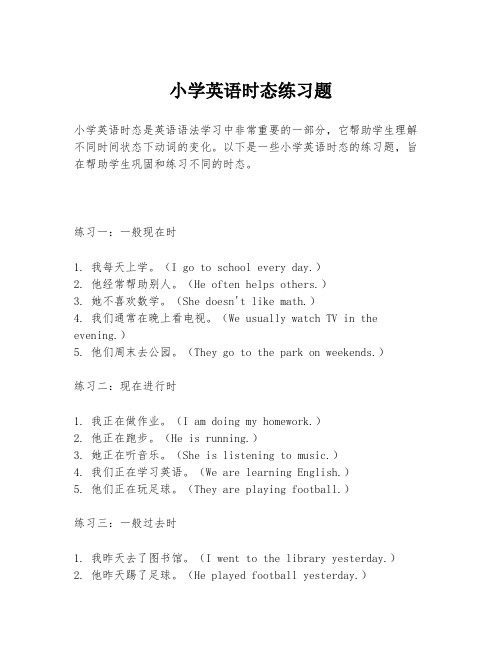
小学英语时态练习题小学英语时态是英语语法学习中非常重要的一部分,它帮助学生理解不同时间状态下动词的变化。
以下是一些小学英语时态的练习题,旨在帮助学生巩固和练习不同的时态。
练习一:一般现在时1. 我每天上学。
(I go to school every day.)2. 他经常帮助别人。
(He often helps others.)3. 她不喜欢数学。
(She doesn't like math.)4. 我们通常在晚上看电视。
(We usually watch TV in the evening.)5. 他们周末去公园。
(They go to the park on weekends.)练习二:现在进行时1. 我正在做作业。
(I am doing my homework.)2. 他正在跑步。
(He is running.)3. 她正在听音乐。
(She is listening to music.)4. 我们正在学习英语。
(We are learning English.)5. 他们正在玩足球。
(They are playing football.)练习三:一般过去时1. 我昨天去了图书馆。
(I went to the library yesterday.)2. 他昨天踢了足球。
(He played football yesterday.)3. 她昨天看了电影。
(She watched a movie yesterday.)4. 我们昨天去了动物园。
(We went to the zoo yesterday.)5. 他们昨天看了一场音乐会。
(They watched a concert yesterday.)练习四:一般将来时1. 我明天会去购物。
(I will go shopping tomorrow.)2. 他明天要参加一个生日派对。
(He is going to attend abirthday party tomorrow.)3. 她明天会去图书馆。
专项练习:小学六年级上册英语时态

专项练习:小学六年级上册英语时态介绍本文档旨在帮助小学六年级上册的学生巩固和练习英语时态的知识。
时态是英语语法中非常重要的一部分,正确的时态使用能够帮助我们准确表达过去、现在和将来的动作和状态。
时态分类英语中常见的时态有以下几种:1. 一般现在时(Simple Present Tense)2. 一般过去时(Simple Past Tense)3. 一般将来时(Simple Future Tense)4. 现在进行时(Present Continuous Tense)5. 过去进行时(Past Continuous Tense)6. 将来进行时(Future Continuous Tense)7. 现在完成时(Present Perfect Tense)8. 过去完成时(Past Perfect Tense)9. 将来完成时(Future Perfect Tense)练习内容以下是一些练习题,供学生进行时态的练习:1. 请将下列句子改写为一般现在时:- He eats an apple every day.- They play football on weekends.- She goes to school by bus.2. 请将下列句子改写为一般过去时:- I watch a movie last night.- We visit our grandparents yesterday.- The cat catches a mouse yesterday.3. 请将下列句子改写为一般将来时:- They will go to the park tomorrow.- She is going to buy a new dress next week.- He will finish his homework tonight.4. 请将下列句子改写为现在进行时:- They eat dinner at the moment.- We go swimming now.- He reads a book right now.5. 请将下列句子改写为过去进行时:- She is studying English yesterday.- They are playing basketball last night.- I am writing a letter now.6. 请将下列句子改写为将来进行时:- I am having a party next month.- We are going on a vacation next week.- They are visiting their grandparents tomorrow.7. 请将下列句子改写为现在完成时:- He has finished his homework already.- They have seen that movie before.- She has visited Paris twice.8. 请将下列句子改写为过去完成时:- We had already left when you arrived.- He had eaten lunch before he came to the party.- They had finished the project by last week.9. 请将下列句子改写为将来完成时:- She will have graduated by next year.- He will have written the report before the deadline.总结通过以上练习,希望同学们能够巩固和掌握不同时态的用法。
小学六年级英语时态练习题及答案

小学六年级英语时态练习题及答案一、时态概念回顾在学习英语时态之前,我们首先需要了解时态的概念。
时态指的是动词表示的动作或状态发生的时间。
英语中常用的时态有以下几种:一般现在时、一般过去时和一般将来时。
在学习英语时态时,我们需要掌握每种时态的基本用法和表示的时间。
二、一般现在时练习题1. 选择正确的动词形式填空。
1.He ______ (go/goes) to school every day.2.My sister ______ (likes/like) playing basketball.3.They ______ (watch/watches) TV in the evening.4.The train ______ (arrive/arrives) at 6 o’clock.5.I ______ (play/plays) the piano on weekends.2. 根据句子的意思,选择正确的答案。
1.______ your parents work in a factory? (Does/Do)2.We ______ basketball after school. (plays/play)3.Tom ______ a sandwich for lunch. (eat/eats)4.______ your brother like swimming? (Does/Do)5.My teacher ______ English very well. (teach/teaches)答案:1.goes2.likes3.watch4.arrives5.play6.Do7.play8.eats9.Does10.teaches三、一般过去时练习题1. 选择动词的适当形式填空。
1.He ______ (go/went) to the park yesterday.2.They ______ (watch/watched) a movie last night.3.She ______ (visit/visited) her grandparents on the weekend.4.We ______ (play/played) football yesterday.5.The cat ______ (catch/caught) a mouse just now.2. 根据句子的意思,选择正确的答案。
(完整版)小学英语时态讲解及练习

小学英语语法【一】一般现在时一般现在时基本用法介绍一、一般现在时的功能1.表示事物或人物的特征、状态。
如:The sky is blue.天空是蓝色的。
2。
表示经常性或习惯性的动作.如:I get up at six every day。
我每天六点起床。
3。
表示客观现实。
如:The earth goes around the sun.地球绕着太阳转。
二、一般现在时的构成1.be动词:肯定句:主语+be(am,is,are)+其它。
如:I am a boy。
我是一个男孩。
2.行为动词:肯定句:主语+行为动词(+其它)。
如:We study English.我们学习英语.当主语为第三人称单数(he, she,it)时,要在动词后加”-s”或"-es”。
如:Mary likes Chinese。
玛丽喜欢汉语。
动词+s的变化规则1.一般情况下,直接加-s,如:cook-cooks,2.以s. x。
sh。
ch. o结尾,加-es,如:guess-guesses, wash-washes, watch—watches, go—goes 3.以“辅音字母+y"结尾,变y为i, 再加-es,如:study—studies特殊:have——--has三、一般现在时的变化1.be动词的变化。
否定句:主语+ be + not +其它。
如:He is not a worker.他不是工人。
一般疑问句:Be +主语+其它.如:-Are you a student? -Yes。
I am。
/ No, I'm not。
特殊疑问句:疑问词+一般疑问句.如:Where is my bike?2。
行为动词的变化。
否定句:主语+ don’t(doesn’t ) +动词原形(+其它)。
如:I don't like bread。
当主语为第三人称单数时,要用doesn't构成否定句。
如:He doesn’t often play.一般疑问句:Do( Does ) +主语+动词原形+其它.如:— Do you often play football? - Yes, I do. / No,I don’t.当主语为第三人称单数时,要用does构成一般疑问句。
小学英语:一般现在时时态结构练习和全面解析

一般现在时语法专项突破1.January is the ________ month in a year.A.one B.a C.first全面分析:一月是一年中的第一个月。
第几个月需要序数词,选项A和B都是基数词,故选C。
2.It____a short tail.A.has B.have C.is D.are全面分析:它有一条短尾巴。
A. 有(第三人称单数形式);B. 有(动词原形)C.是(第三人称单数),D.是(复数)。
主语it是第三人称单数,因此谓语动词也要用第三人称单数形式,该句子表达“拥有”,故选A。
3.My sister ______ to school early every morning.A.go B.went C.goes全面分析:我妹妹每天早上都很早上学。
every morning每天早上,是一般现在时的时间状语,主语是第三人称单数,谓语动词用单三形式,A去,动词原形;B去,动词过去式;C去,动词单三形式。
故选C.4.This is Guo Yang. He ____ playing the erhu.A.like B.likes C.have全面分析:我是郭阳。
他拉二胡。
A喜欢,动词原形;B喜欢,动词单三形式;C有,动词原形,本句主语是第三人称单数,谓语动词用单三形式。
故选B。
5.Lily _____ playing baseball.A.like B.don't like C.doesn't like全面分析:莉莉打篮球。
A喜欢,动词原形,本句主语是第三人称单数,谓语动词用单三形式,排除;B不喜欢,本句主语是第三人称单数,助动词用doesn't,排除;C不喜欢。
故选C.6.Kitty and Alice are friends. They are in the class.A.same B.different C.all全面分析:Kitty 和Alice是朋友。
- 1、下载文档前请自行甄别文档内容的完整性,平台不提供额外的编辑、内容补充、找答案等附加服务。
- 2、"仅部分预览"的文档,不可在线预览部分如存在完整性等问题,可反馈申请退款(可完整预览的文档不适用该条件!)。
- 3、如文档侵犯您的权益,请联系客服反馈,我们会尽快为您处理(人工客服工作时间:9:00-18:30)。
六年级英语教案Miss Wang英语语法【一】一般现在时一般现在时基本用法介绍一、一般现在时的功能1.表示事物或人物的特征、状态。
如:The sky is blue.天空是蓝色的。
2.表示经常性或习惯性的动作。
如:I get up at six every day.我每天六点起床。
3.表示客观现实。
如:The earth goes around the sun.地球绕着太阳转。
二、一般现在时的构成1.be动词:肯定句:主语+be(am,is,are)+其它。
如:I am a boy. 我是一个男孩。
2.行为动词:肯定句:主语+行为动词(+其它)。
如:We study English.我们学习英语。
当主语为第三人称单数(he, she,it)时,要在动词后加"-s"或"-es"。
如:Mary likes Chinese.玛丽喜欢汉语。
动词+s的变化规则1.一般情况下,直接加-s,如:cook-cooks,2.以s. x. sh. ch. o结尾,加-es,如:guess-guesses, wash-washes, watch-watches, go-goes3.以“辅音字母+y”结尾,变y为i, 再加-es,如:study-studies特殊:have----has三、一般现在时的变化1.be动词的变化。
否定句:主语+ be + not +其它。
如:He is not a worker.他不是工人。
一般疑问句:Be +主语+其它。
如:-Are you a student? -Yes. I am. / No, I'm not.特殊疑问句:疑问词+一般疑问句。
如:Where is my bike?2.行为动词的变化。
否定句:主语+ don't( doesn't ) +动词原形(+其它)。
如:I don't like bread.当主语为第三人称单数时,要用doesn't构成否定句。
如:He doesn't often play.一般疑问句:Do( Does ) +主语+动词原形+其它。
如:- Do you often play football? - Yes, I do. / No, I don't.当主语为第三人称单数时,要用does构成一般疑问句。
如:- Does she go to work by bike?- Yes, she does. / No, she doesn't.特殊疑问句:疑问词+一般疑问句?如:How does your father go to work?一般现在时用法练习一、出下列动词的第三人称单数drink ________ go _______ stay ________ make ________look _________ have_______ pass_______ carry ____ come________ watch______ plant_______ fly ________study_______ brush________ do______ teach_______ like play read wash be二、用括号内动词的适当形式填空。
1.He often ________(have) dinner at home.2.Daniel and Tommy _______(be) in Class One.3.We _______(not watch) TV on Monday.4.Nick _______(not go) to the zoo on Sunday.5.______ they ________(like) the World Cup?6.What _______they often _______(do) on Saturdays?7._____ your parents _______(read) newspapers every day?8.The girl _______(teach) us English on Sundays.9.She and I ________(take) a walk together every evening. 10.There ________(be) some water in the bottle. 11.Mike _______(like) cooking. 12.They _______(have) the same hobby.13.My aunt _______(look) after her baby carefully. 14.You always _______(do) your homework well.15.I _______(be) ill. I’m staying in bed. 16.She _______(go) to school from Monday to Friday. 17.Liu Tao _______(do) not like PE. 18.The child often _______(watch) TV in the evening.19.Su Hai and Su Yang _____(have) eight lessons this term.20. -What day _____(be) it today?-It’s Saturday.三、按照要求改写句子1.Daniel watches TV every evening.(改为否定句)___________________________________________________2.I do my homework every day.(改为一般疑问句,作否定回答)________________________________________________________3.She likes milk.(改为一般疑问句,作肯定回答)__________________________4.Amy likes playing computer games.(改为一般疑问句,作否定回答)___________________________________________________5.We go to school every morning.(改为否定句)_______________________________________________________6.He speaks English very well.(改为否定句)___________________________________________________7.I like taking photos in the park.(对划线部分提问)________________________________________________________8.John comes from Canada.(对划线部分提问)___________________________________________________9.She is always a good student.(改为一般疑问句,作否定回答)________________________________________________________10.Simon and Daniel like going skating.(改为否定句)___________________________________________________四、改错(划出错误的地方,将正确的写在横线上)1.Is your brother speak English? __________________2.Does he likes going fishing? __________________3.He likes play games after class. __________________4.Mr. Wu teachs us English. __________________5.She don’t do her homewo rk on Sundays. _________________英语语法【二】现在进行时现在进行时1.现在进行时表示现在正在进行或发生的动作,也可表示当前一段时间内的活动或现阶段正在进行的动作。
2.现在进行时的肯定句基本结构为be+动词ing.3.现在进行时的否定句在be后加not。
4.现在进行时的一般疑问句把be动词调到句首。
5.现在进行时的特殊疑问的基本结构为:疑问词+ be + 主语+ 动词ing?但疑问词当主语时其结构为:疑问词+ be + 动词ing?标志词:look now listen It’s +点钟动词加ing的变化规则1.一般情况下,直接加ing,如:cook-cooking2.以不发音的e结尾,去e加ing,如:make-making, taste-tasting ,write—writing , ride—riding ,have—having come—coming dance—dancing live—living take—taking skate—skating3.如果末尾是一个元音字母和一个辅音字母,双写末尾的辅音字母,再加ing,如:swim—swimming begin—beginning run-running, sit—sitting put—putting get—getting shop—shopping stop-- stopping 现在进行时练习一、写出下列动词的现在分词:play________ run__________ swim _________make__________go_________ skate________ write________ ski___________read________ have_________ sing ________ dance_________put_________ see________ buy _________ love____________live_______ take_________ come ________ get_________stop_________ sit ________ begin________ shop___________二、用所给的动词的正确形式填空:1.The boy __________________ ( draw)a picture now.2. Listen .Some girls _______________ ( sing)in the classroom .3. My mother _________________ ( cook )some nice food now.4. What _____ you ______ ( do ) now?5. Look . They _______________( have) an English lesson .6.They ____________(not ,water) the flowers now.7.Look! the girls ________________(dance )in the classroom .8.What is our granddaughter doing? She _________(listen ) to music.9. It’s 5 o’clock now. We _____________(have)supper now10.______Helen____________(wash )clothes? Yes ,she is .三、句型转换:1. They are doing housework .(分别改成一般疑问句和否定句)__________________________________________________________________________________________________________________________2.The students are cleaning the classroom . ( 改一般疑问句并作肯定和否定回答)__________________________________________________________________________________________________________________________________3.I’m playing the football in the playground .(对划线部分进行提问)_________________________________________________________________4.Tom is reading books in his study . (对划线部分进行提问)英语语法【三】一般将来时一、概念:表示将要发生的动作或存在的状态及打算、计划或准备做某事。
